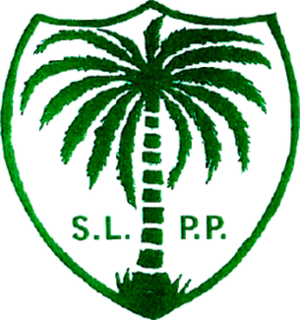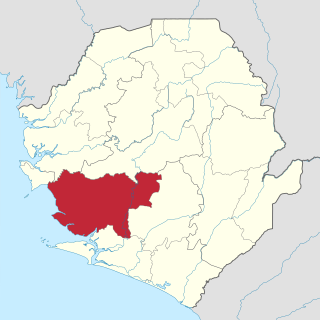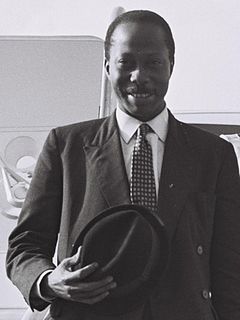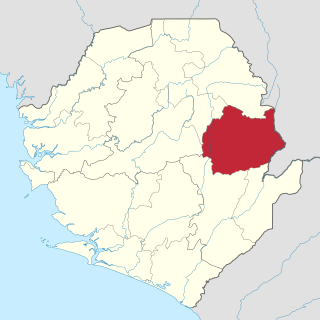Related Research Articles
Sierra Leone first became inhabited by indigenous African peoples at least 2,500 years ago. The Limba were the first tribe known to inhabit Sierra Leone. The dense tropical rainforest partially isolated the region from other West African cultures, and it became a refuge for peoples escaping violence and jihads. Sierra Leone was named by Portuguese explorer Pedro de Sintra, who mapped the region in 1462. The Freetown estuary provided a good natural harbour for ships to shelter and replenish drinking water, and gained more international attention as coastal and trans-Atlantic trade supplanted trans-Saharan trade.

The Sierra Leone People's Party (SLPP) is one of the two major political parties in Sierra Leone, along with its main political rival the All People's Congress (APC). It has been the ruling party in Sierra Leone since April 4, 2018.

Siaka Probyn Stevens was the leader of Sierra Leone from 1967 to 1985, serving as Prime Minister from 1967 to 1971 and as President from 1971 to 1985. Stevens' leadership was often characterized by patrimonial rule and self-indulgence, consolidating power by means of corruption and exploitation.

Julius Maada Wonie Bio is a Sierra Leonean politician, and the current president of Sierra Leone since 4 April 2018. He is a retired brigadier general in the Sierra Leone Army and was the military head of state of Sierra Leone from 16 January 1996, to 29 March 1996, in a military junta government known as the National Provisional Ruling Council (NPRC). As the candidate of the main opposition Sierra Leone People's Party (SLPP), Bio defeated Samura Kamara of the ruling All People's Congress (APC) in the runoff vote of the 2018 Sierra Leone presidential election with 51.8% of the votes to Kamara's 48.2%. International and local observers declared the election free and fair. Bio succeeded Ernest Bai Koroma as president. As the main opposition leader, Bio was a critic of his predecessor president Ernest Bai Koroma and his administration. As president, Bio has overturned most of the policies of Ernest Bai Koroma, whom he accuses of corruption, and the two men rarely speak to each other.

Moyamba District is a district in the Southern Province of Sierra Leone, with a population of 318,064 in the 2015 census. Its capital and largest city is Moyamba. The other major towns include Njala, Rotifunk and Shenge. The district is the largest in the Southern Province by geographical area, occupying a total area of 6,902 km2 (2,665 sq mi) and comprises fourteen chiefdoms.
The Ndogboyosoi War, also known as the Bush Devil War, was an episode of political violence that occurred in 1982 between supporters of the All People's Congress (APC) and the Sierra Leone People's Party (SLPP) in Sierra Leone. The violence was centered in Pujehun District, especially in the Soro-Gbema chiefdom. It was triggered by the ruling APC party's alleged electoral manipulation and the intervention of a special squad of customs police against supporters of the SLPP candidate.

Brigadier David Lansana was the first indigenous armed force commander of the Sierra Leone Military during the colonial era. After Sierra Leone gained independence, he served as Military Attaché to the United States.

Kono District is a district in the Eastern Province of Sierra Leone. Its capital and largest city is Koidu Town. Motema is the second most populous city in the district. The other major towns in the district include Yengema, Tombodu, Jaiama Nimikor and Sewafe. The district is the largest diamond producer in Sierra Leone. The population of Kono District is 505,767. Kono District borders Kenema District to the southwest, The Republic of Guinea to the east, Koinadugu District to the northeast and Kailahun District to the southeast. Kono District is divided into fourteen chiefdoms.

Kenema District is a district in the Eastern Province of Sierra Leone. Its capital and largest city is Kenema, which is the third most populous city in Sierra Leone, after Freetown and Bo. Tongo is the second most populous city in the district. Other major towns in Kenema District include Blama and Yomboma. The district is the most populous district in the Eastern province with a population 609,873. Kenema District has an area of 6,053 km2 (2,337 sq mi) and comprises sixteen chiefdoms.

General elections were held in Sierra Leone on 11 August 2007. Seven candidates competed in the first round of the presidential election; no candidate received the necessary 55% of the vote to win in the first round, and a second round was held between the top two candidates, Ernest Bai Koroma of the All People's Congress (APC) and Solomon Berewa of the Sierra Leone People's Party (SLPP), on 8 September. According to official results, Koroma won the election with 54.6% of the vote.
Kono Progressive Movement was a political party in Kono, Sierra Leone, that emerged in the mid-1950s with the backdrop of the expansion of diamond mining activities there are the growing feeling amongst a section of the Kono people that they were not reaping the benefits of the diamond boom. KPM was led by Tamba Sungu Mbriwa. The movement became part of the political opposition, as there was a break between it and the ruling Sierra Leone People's Party only a few months after the founding of KPM. Prominent figures in the area, such as Tamba Ngegba, J.S. Kpakiwa and T.R. Foyoh.
Democratic People's Congress was a political party in Sierra Leone. It was founded in July 1965, by remaining elements of the Sierra Leone Progressive Independence Movement in Kono. DPC consisted of a generation of younger former SLPIM cadres. By the end of July DPC declared that it would work in alliance with the All People's Congress.
Sierra Leone Independence Movement was a Freetown-based political party in Sierra Leone, was founded in 1957. The movement was led by Edward Wilmot Blyden III. The party contested four Freetown constituencies in the 1957 election, but did not win any seat.

Paramount Chief Ella Koblo Gulama OBE, GCOR was a Sierra Leonean paramount chief and politician. In 1957, she became the first elected female Member of Parliament in Sierra Leone. She was re-elected in 1962. During the government of Milton Margai, Gulama became Sierra Leone and sub-Saharan Africa's first female Cabinet Minister.
Tamba Songu M'briwa was a prominent Sierra Leonean politician and paramount chief from the Kono ethnic group, who formed one of the few political parties in Sierra Leone before independence.
Julius Momoh Gulama was a Sierra Leonean paramount chief, statesman and educator in the preindependence era. As paramount chief of Kaiyamba Chiefdom, he ruled the largest and most powerful Mende chiefdom in the Sierra Leone.

General elections were held in Sierra Leone in May 1962, just over a year after the country gained independence from the United Kingdom. This was the first to be held under universal suffrage. The elections were won by the ruling Sierra Leone People's Party (SLPP), although his party received fewer votes than independent candidates. SLPP leader Milton Margai remained Prime Minister.

In April 1961, Sierra Leone became politically independent of Great Britain. It retained a parliamentary system of government and was a member of the British Commonwealth of Nations. The Sierra Leone People's Party (SLPP), led by Sir Milton Margai were victorious in the first general election under universal adult franchise in May 1962. Upon Sir Milton's death in 1964, his half-brother, Sir Albert Margai, succeeded him as Prime Minister. Sir Albert attempted to establish a one-party state had the ready cooperation of the opposition All People' Congress but met fierce resistance from some cadre within his party Sierra Leone People's Party (SLPP) and ultimately abandoned the idea.

Falaba District is a district in the Northern Province of Sierra Leone. It is one of the sixteen Districts of Sierra Leone. Its capital and largest town is Bendugu. Other towns in Falaba District include Falaba, Sikunia, Krubola, Bafolia and Yiffin. Falaba District is divided into thirteen chiefdoms. Falaba District is one of the largest Districts in Sierra Leone in land area, However, it is one of the least most populous districts in the country. Falaba District is known for its largely conservative Muslim population. Falaba District has a population of 205,353, based on 2018 estimate.
References
- ↑ Konos remember Aiah Abu Koroma in Sierra Leone
- ↑ Cartwright, John (1978). "Reviewed work: Historical Dictionary of Sierra Leone, Cyril P. Foray". Canadian Journal of African Studies. 12 (2): 298–299. doi:10.2307/484908. JSTOR 484908.
- 1 2 3 4 5 6 7 8 9 Hayward, Fred M. (1972). "The Development of a Radical Political Organization in the Bush: A Case Study in Sierra Leone". Canadian Journal of African Studies. 6 (1): 1–28. doi:10.1080/00083968.1972.10803654. JSTOR 484149.
- ↑ Salone Entertainment
- ↑ Elections in Sierra Leone
- 1 2 3 Minikin, Victor (1973). "Indirect Political Participation in Two Sierra Leone Chiefdoms". The Journal of Modern African Studies. 11 (1): 129–135. doi:10.1017/S0022278X00008119. JSTOR 159876.